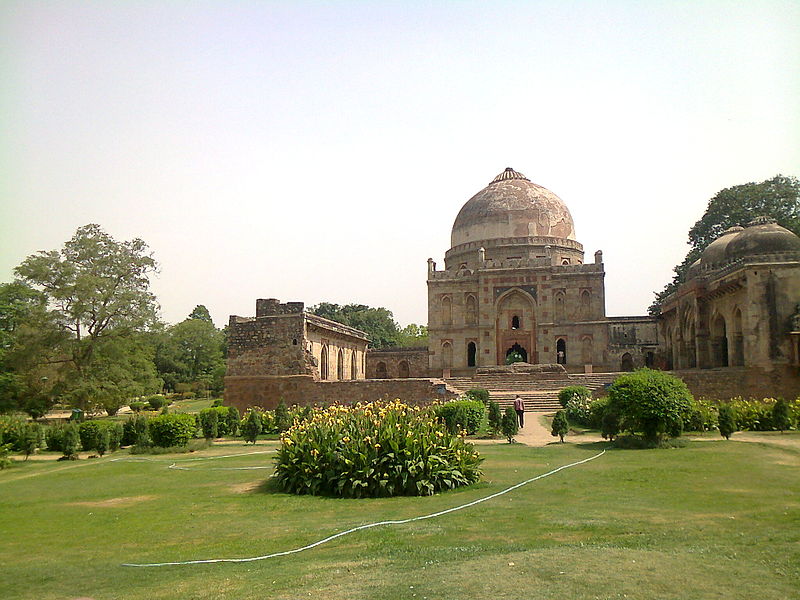
New Delhi: It is 6.30 in the morning as a group of 12 poets assemble at the Purana Gumbad in Lodi Gardens Sunday under the banner “Poetry on Monuments”, a monthly poetry promotion initiative at heritage sites in the capital.
The group sat in a circle as the readings began in Hindi, English and Urdu under the shadow of the monument. In no time, several onlookers and morning walkers were converts, swearing loyalty to poetry.
Established names in poetry like Markand Paranjape, Sukrita Paul Kumar and Urdu poet Tarannum Riyaz shared space and poetry with newbies like Kumar Anupam and Preeti Singh.
“We began the initiative last month. We will take it to the seven ancient landmarks of Delhi: Humayun’s Tomb, Lodi Gardens, Sher Mandnal in Purana Qila (Old Fort), Feroz Shah Kotla, Siri Fort and and Tughlaqabad, culminating Dec 27 on Mirza Ghalib’s birthday at the Ghalib Building in Ballimaran,” said Abhay K., a young diplomat.
The rejuvenating appeal of the timeless verse in an age of uncertainties has triggered a revival of the poetry movement in India.
Enterprising poets, poetry lovers and professionals with a flair for fine writing have taken up the mission to spread the niche genre in more innovative ways, breathing life back to a craft edged to the sidelines by poor publishing returns and loss of interest.
Two refreshing initiatives, “Poetry on Monuments” and “Poetry of Cross-Cultures”, have taken poetry out of books, conventional readings and literature festivals to form bigger circles of poets and audience in public spaces and across cultures.
Conceived by Abhay K. and poet Alka Tyagi a month ago, the objective of ‘Poetry on Monuments’ is two-fold – one to bring poetry back to Delhi and the rest of India and to pay homage to 3,000 years of Delhi’s heritage.
“Feroz Shah was a poet and Bahadur Shah Zafar was also a poet,” Abhay K. said. Abhay, who works in the Ministry of External Affairs, will release his new poetry collection “Remains” on June 28.
Poet Rita Malhotra, a reader in mathematics at Delhi University’s Kamla Nehru College, is desperately hunting for new Indian love poetry for a Hungarian exchange programme in September. She conducts “Poetry of Cross-Cultures” – a cultural exchange forum that exposes new Indian poetry in foreign countries and vice versa to promote people-to-people contact.
“I began the poetry exchange in 2007 after an Indo-Finland poetry reading at the embassy,” said Malhotra. She has since collaborated with nearly every European country with the help of their diplomatic missions in India.
According to young poet Preeti Singh, who gave up her job in a multinational bank to study poetry and art, “the new promotions help young poets to learn from older ones and connect to new segments of listeners”.
“For me, it was a craving since childhood to write poetry. I wanted to come out of the corporate confines,” she said.
H.K. Kaul, the general secretary of the capital-based Poetry Society of India, observed that due to lack of distribuition facilities publication of poetry has remained a non-commercial activity in India.
In the early 1980s, Kaul discussed the shrinking space for poetry with intellectuals to set up the Poetry Society of India to promote Indian poetry through international exchanges, school workshops, publications and financial assistance to emerging poets.
The model of “Poetry on Monuments” echoes in the Bangalore-based Poet’s Nook, a forum of poets and enthusiasts to read and discuss the genre. Prarthana Banikya, the founder of Poet’s Nook, says poets and poetry lovers come together once every month to find a quiet nook for themselves to read.
The promotion forums make extensive use of social media to connect to readers and poets worldwide with decidated sites on Facebook and Twitter.
“There is a sudden kind of sprouting of these groups. It is a nice thing but if they become an excuse for networking or socializing, then the purpose is lost. Poetry gets marginalised all the time. But such initiatives have to retain their informal character,”said poet Sukrita Paul Kumar.
Kumar said another forum, Delhi Poetree, founded by working poet Amit Dahiyabadshah was also promoting poetry in the capital and NCR region.
The organisation aims to make at least 100 poets sustainable with taxable income from poetry by 2015.
IANS
The opinions, beliefs and viewpoints expressed by authors, news service providers on this page do not necessarily reflect the opinions, beliefs and viewpoints of Hill Post. Any views or opinions are not intended to malign any religion, ethnic group, club, organization, company, or individual.
Hill Post makes no representations as to the accuracy or completeness of any information on this site page.


